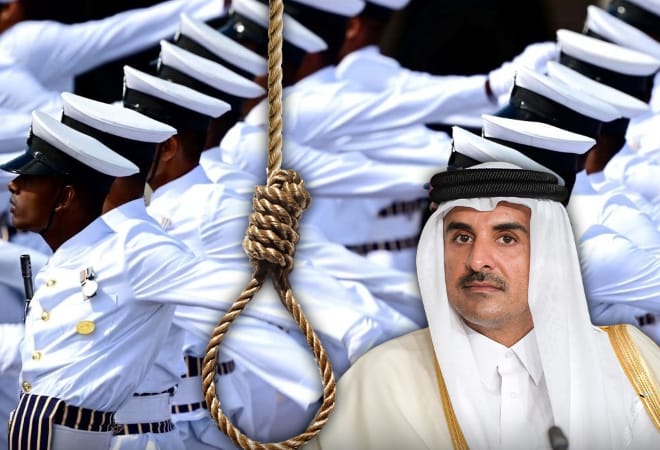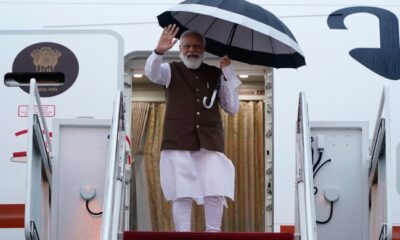Qatar’s Court of First Instance verdict to send eight Indian nationals to the gallows causes grave concern in India
Qatar’s Court of First Instance verdict to send eight Indian nationals to the gallows causes grave concern in India
In the backdrop of the Middle East passing through a delicate phase, last week saw India’s challenges in the region growing even more serious following the decision by the Court of First Instance in Qatar to send eight Indian nationals to the gallows.
Reportedly, since last year, these Indian Navy ex-servicemen have been in detention in Doha on espionage charges which remain unspecified and opaque.
New Delhi has expressed its “rude shock” at the verdict and is reportedly exploring all possible legal and diplomatic options, though as of this writing the official copy of the Qatari court’s judgment was not in New Delhi’s possession, making it difficult to articulate a coherent stand.
These former personnel of the Indian Navy were employees of a private company called Al Dahra and were arrested last year in August by Qatar intelligence agency from Doha. What is interesting is that the owner of the company, an ex-serviceman of the Royal Oman Air Force was also arrested but later released in November.
However, the eight Indian Navy veterans continued to be tried in an extremely confidential manner and regardless New Delhi being granted consular access to them, the challenges have been quite visible from the beginning.
Ironically, Qatar’s refusal has already cast a shadow on this case and now with a formal declaration of the death sentence, New Delhi has its task cut out.
With over seven lakh Indians in Qatar and with Qatar meeting almost 40 per cent of India’s LNG requirements, this is a relationship that has been in the best of health in recent years.
For most Indians it has not only been disconcerting to see their retired servicemen being treated like this but it has also raised questions about the very nature of India-Qatar ties which seem to be propelled by energy and people-to-people engagements.
With more than seven lakh Indians in Qatar and with Qatar meeting almost 40 per cent of India’s LNG requirements, this is a relationship that has been in the best of health in recent years.
There is also a framework agreement on defence and security cooperation singed in 2008 envisages maritime training, joint-exercise and enhancing defence manufacturing bases in the two nations. For Qatar, building robust ties with an emerging economic power like India has been a priority as it seeks diversification in its external relationships, while for New Delhi it has been about strengthening partnership with a Gulf state that punches above its weight in the region and beyond. There is a reason why when Qatar was isolated and feeling the heat of Saudi-led blockade in 2017-2021, India continued with its economic engagement with Doha.
The Middle East has been one of the biggest success stories of Modi government’s foreign policy in the last decade. With some deft diplomatic footwork and a new found nimbleness, New Delhi has managed to build remarkably strong ties with the Arab states in the Gulf. Looking beyond just energy ties and diaspora linkages, Indian approach to the region has assumed a strategic character, making way for a wider regional policy response instead of merely bilaterals as reflected in the emergence of that I2U2 (India, Israel, UAE and the US) minilateral. This converged in the high-profile announcement during last month’s G-20 summit in New Delhi of the India-Middle East-Europe Economic Corridor – a multi-modal transport and economic corridor connecting three geographies aimed at boosting economic prosperity and bridging the infrastructure deficit.
With some deft diplomatic footwork and a new found nimbleness, New Delhi has managed to build remarkably strong ties with the Arab states in the Gulf.
The crisis brewing in the Middle East today is likely to keep the pressure on India. The Israel-Hamas conflict and the challenges for all the regional stakeholders that it has thrown up has complicated intra-regional ties. Qatar’s decision to challenge the foundations of an essentially strong relationship will provoke a rethink in India about the future sustainability of this relationship. That this case involves, according to some reports, allegations of spying for Israel adds another layer of complexity at a time when the Arab street is seething at Israel.
New Delhi will have to tread cautiously though India is not without levers when it comes to bilateral ties. From high-level political engagement to moving through the appeals process and even invoking the provisions of the 2015 pact on the transfer of sentenced prisoners, all the options will no doubt have to be explored. But fundamentally, New Delhi will have to remind Doha that the very future of this bilateral relationship now stands at a crossroad. It is not simply a matter between two governments but also involves the sentiments of 1.4 billion Indians. I
If this crisis is not resolved in an amicable manner, future cooperation will be difficult to envision under public pressure.
The reasons behind the timing and severity of the punishment meted out by the Qatari court are best known to Doha but its implications for India’s ties with Qatar can be far reaching. In the past, Qatar’s lack of sensitivity to Indian concerns about extremist voices could have been brushed aside, but the present predicament pertaining to ex-Indian servicemen has the potential to do some lasting damage to this bilateral relationship despite some significant convergences between Doha and New Delhi.
News Edit K.V.Raman


















